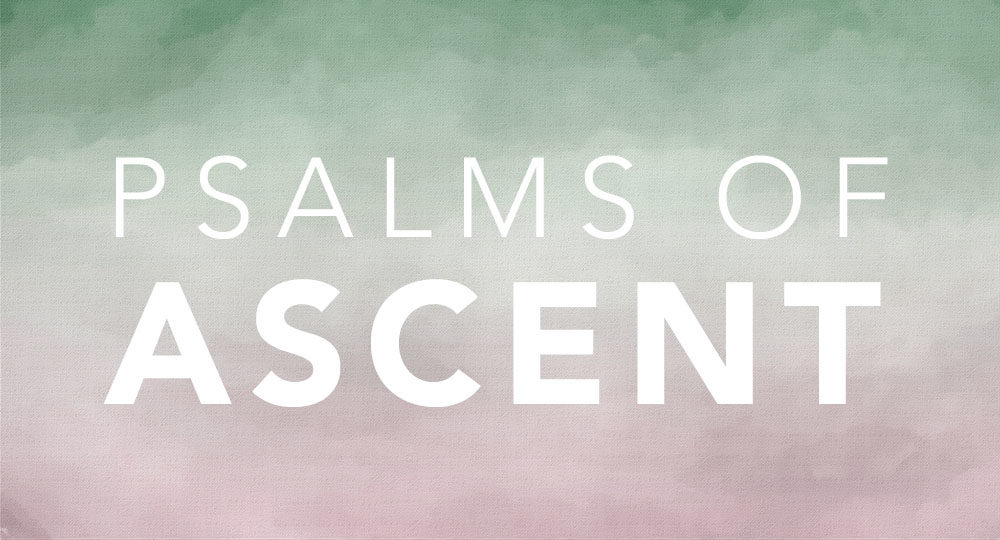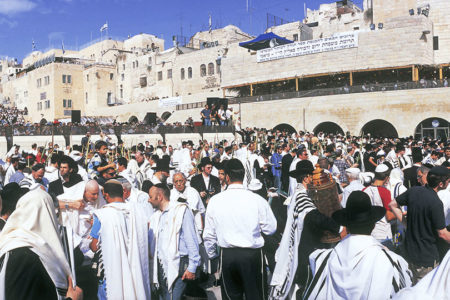Psalm 126: O Jerusalem
On Wednesday, June 7, 1967, the wail of a ram’s horn blown at the base of the Western Wall in Jerusalem shook the world. Surrounded by young paratroopers with tear-stained faces, Rabbi Shlomo Goren raised the shofar to his lips and sounded the call that changed history and silenced those who said it could never be.
The sounding of the shofar was an affirmation, signaling the reunification of Jerusalem under Jewish sovereignty after more than 2,000 years. It seemed as though the psalmist’s words were coming to life:
When the Lᴏʀᴅ brought back the captivity of Zion, we were like those who dream. Then our mouth was filled with laughter, and our tongue with singing. Then they said among the nations, “The Lᴏʀᴅ has done great things for them.” The Lᴏʀᴅ has done great things for us, and we are glad (Ps. 126:1–3).
Jewish people the world over sang, echoing the words Zionist poet Naphtali Herz Imber penned in 1877 that were destined to become the lyrics for “Hatikva,” Israel’s national anthem:
So long as still within our breasts
The Jewish heart beats true,
So long as still towards the east
To Zion looks the Jew.
So long our hopes are not yet lost—
Two thousand years we cherished them—
To live in freedom in the land of
Zion and Jerusalem.
Though the full scope of emotion cannot be captured in words alone, perhaps the unsurpassed importance of the moment was best expressed by Major General Uzi Narkiss, a commander for the Israel Defense Forces during the 1967 Six-Day War. General Narkiss was immediately surrounded by exultant paratroopers when he arrived at the wall. Throughout the night, he had mulled over what he would say if Israel succeeded in capturing the area. When the moment arrived, the loquacious commander found himself speechless.
“I was not,” he said later, “in any way prepared for this occasion. But as I stood there, I became suddenly conscious that in some inexpressible way, every Jew who had ever lived over the last 2,000 years seemed to be gathered at the wall with me.”
The Lord indeed had “done great things” for Israel, for the events of that June day brought a miraculous partial fulfillment of what God had promised the long-harassed nation centuries earlier. When in AD 70 the legions of imperial Rome ruthlessly displaced the Jewish people from their land to begin their 2,000 withering years in exile, an indifferent world believed the story of Eretz Yisrael was over.
But the sneering cynics were wrong. The psalmist’s call, “Bring back our captivity, O Lᴏʀᴅ” (v. 4), rang in the ears of the scattered Jews of the Diaspora, to be intoned in the hope expressed annually at Jewish Passover tables around the world: “Next year in Jerusalem.” And then, on a spring day in 1948, a spectacular phenomenon occurred. For the first time in history, a virtually dead nation quit the sepulcher: Israel was reborn.
Up to Jerusalem
Again the songs of the ascenders were real. “Let us go up to Jerusalem” became more than words at a dinner table or the hope of perpetual wanderers. The reality was heard in the second blast of Rabbi Goren’s shofar at the ancient Western Wall.
The first blast was an affirmation: The Jewish people had come home to the only true eternal city, determined never to part from her again. The second blast was an invitation. It was issued to every Jew in the Diaspora and was an offer to come home to the land Almighty God had deeded to the Jewish patriarchs and their posterity millennia ago. Of course, the children of Jacob would not all come immediately, but the door was open; and the Law of Return, which grants automatic Israeli citizenship to Jewish immigrants, became a fact.
Despite the perpetual obsession of anti-Semites to negate God’s promises to national Israel, it is no coincidence that we can easily leap from antiquity to today, linking God’s words to Abraham and what we see in these last days: “Then He [God] brought him outside and said, ‘Look now toward heaven, and count the stars if you are able to number them.’ And He said to him, ‘So shall your descendants be’” (Gen. 15:5).
The promise was punctuated in Genesis 17:8: “Also I give to you and your descendants after you the land in which you are a stranger, all the land of Canaan [Israel], as an everlasting possession; and I will be their God.”
Much to the chagrin of liberal theological front liners, who would have us believe these verses are merely picturesque allegory better suited to bedtime storytelling, they dispense historical fact. This very hour, you can walk in the land, peruse the shops in the streets of a literal Jewish Jerusalem, and converse with the people who were promised to their progenitor, Abraham.
Living the Dream
One of the joys of flying on EL AL jumbo jets to Israel, as I’ve done about 50 times, is conversing with predominantly Jewish people making their first trip to the Holy Land. An elderly couple I once chatted with expressed the sentiment of millions of their kinsmen. “I’ve never been there before, and it’s like living the dream of a lifetime,” said the demure lady with a pleasing voice. “You say you have been there many times. Please tell us what we should see first.”
After we chatted for several minutes, the husband, who had been listening intently, told me, “This is something we have dreamed of all of our lives. But to be honest, I thought we’d never make it. But here we are, on our way to Jerusalem. Can you believe it?”
I did indeed; and as I returned to my seat, I was struck again with a phenomenon so difficult to put into words. The demeanors of the vast majority of Jewish pilgrims who journey to a place they’ve never seen are somewhat altered. Their eyes reflect what springs from their hearts.
Perhaps that is what happened to Abraham, whom God called from his dwelling in Ur of the Chaldees in Mesopotamia (modern Iraq) to go to a place he had never seen in faraway Canaan. Abraham was going home, yet to somewhere that had never been home to him. It was the cord of faith that drew him to the place sanctified by Jehovah as the future home of the Jewish people.
Today the phrase Next Year in Jerusalem is a cord of hope for the future. Someday it will represent a home where peace and security are more than fodder for conversation or political electioneering—not only for a people at long last reconciled to their Messiah (Rom. 11:26–27), but for Jews and Gentiles, princes and kings, and men and women the world over.
The Ultimate Aliyah
One day, when the sounds of tribulation have been drowned by the blast of the last trump, the Lord, with His gathered band of saints, will descend to take the throne in Jerusalem as “King over all the earth” (Zech. 14:9). With His triumphant return, a full thousand years of millennial bliss will grace the planet, and the call will go out to summon His beloved children of Jacob home for the greatest homecoming in history.
Appropriately, as is laid out for us in Zechariah 14, an annual call will go out to the nations to come up to Jerusalem for the Feast of Tabernacles. The call will enliven memories of days gone by, of ancient Israel’s festive time of joy, when the nation reaped the bounty of harvest and the Temple courts showered the city with lights. The Israelites offered sacrifices in anticipation of the procession of the nations moving en masse to the eternal center of the earth: Jerusalem.
And it shall come to pass that everyone who is left of all the nations which came against Jerusalem shall go up from year to year to worship the King, the Lᴏʀᴅ of hosts, and to keep the Feast of Tabernacles (v. 16).
Thus the 15 Psalms of Ascents remind us that all roads across the face of our planet lead to Jerusalem. In a time when many speak of a final Armageddon being near, which will end the chaos, brutality, and moral disintegration, we must remember the end is not yet here.
Rather, we are on a pilgrimage; and contrary to inhabiting a world careening toward a dead end, we live in a world controlled by God, who has mapped the final passage of the times and seasons. The course is up, and we’ll be meeting in Jerusalem for an appointment with the King.





